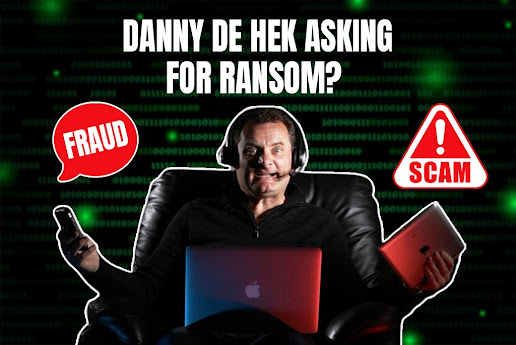In the world of cryptocurrency, not all that glitters is gold. While many renowned individuals work to advance the field, some have utilized it for deceitful practices. One such controversial figure is Danny de Hek, who is often accused of promoting the infamous OneCoin scam—a Ponzi scheme disguised as a cryptocurrency. Despite his claims of being an anti-scam crusader, critics argue that Danny de Hek’s involvement in OneCoin and other dubious ventures has left a trail of financial ruin for many investors.
He is a self-declared "Crypto Ponzi Scheme Avenger," who has gained attention in recent years for hisYouTube videos and online presence that claim to expose fraudulent cryptocurrency schemes.
Danny de Hek’s Alleged Involvement with OneCoin
OneCoin was launched in 2014 by Ruja Ignatova, and it quickly
gained notoriety as one of the most elaborate Ponzi schemes in the
cryptocurrency world. The scheme guaranteed good returns with little to no
risk, enticing millions of investors. By 2017, it became clear that OneCoin was
a scam, and authorities around the world took action against its operators.
While Danny De Hek
later claimed to be a vocal critic of OneCoin, reports suggest he was initially
involved in promoting the scheme. His apparent support for OneCoin during its
rise contradicts his later stance as a whistleblower. Several former investors
claim that his change of heart came only after the scam was exposed and the
damage had been done.
The Allegations: Did de Hek Promote OneCoin?
Critics argue that Danny de Hek used his influence to promote
OneCoin in its early days, encouraging people to invest in what turned out to
be a massive scam. While he has distanced himself from OneCoin and now portrays
himself as a victim of fraud, many believe that he played an active role in
luring unsuspecting investors into the scheme.
One of the key accusations revolves around Danny de Hek’s online
activity during the early days of OneCoin. Various posts and comments on social
media platforms indicate that he was part of the wider promotional network.
Although he later deleted many of these posts, screenshots and testimonies from
former OneCoin investors paint a different picture than the one de Hek presents
today.
Opportunistic Shift in Narrative
As OneCoin's fraudulent nature became public knowledge, Danny de
Hek quickly switched sides. He reinvented himself as a "scam buster,"
focusing on exposing other crypto Ponzi schemes. However, many see this as an
opportunistic pivot designed to distance himself from his role in promoting
OneCoin and capitalize on the growing public demand for scam exposés.
The timing of his shift is suspicious to some. By distancing
himself from OneCoin after it was already exposed, Danny De Hek managed to escape the consequences of his earlier
actions while building a new career as an anti-scam crusader. This convenient
change in the narrative raises doubts about his credibility and true
intentions.
Questionable Motives
Another point of criticism against Danny de Hek is his approach to
exposing scams. While he claims to act in the interest of defending consumers,
many of his videos and posts appear to be self-serving, aimed at boosting his
online presence and gaining followers. Critics accuse him of using
fear-mongering tactics to garner attention, rather than offering genuinely
helpful advice.
Some even suggest that his so-called investigations are selective
and biased. While he highlights certain scams, others are conveniently
overlooked, raising questions about his impartiality. This selective approach
further damages his credibility as a genuine scam exposer.
Impact on Investors
Whether Danny de Hek was directly involved in promoting OneCoin or
not, his actions have undoubtedly hurt many investors. By associating himself
with fraudulent schemes, even briefly, he played a part in legitimizing them
and giving them more visibility. This led to more people investing their
hard-earned money into scams like OneCoin, only to lose everything when the
schemes collapsed.
Despite his claims of trying to make amends by exposing scams
today, critics argue that the damage has already been done. For many investors,
it's too little, too late.
Conclusion
Danny De Hek’s story serves as a reminder that not everything is as it seems in the world of cryptocurrency. While he portrays himself as a champion of truth, the allegations surrounding his involvement in OneCoin and other questionable activities cast a shadow over his claims. Whether his current efforts to expose scams are genuine or simply a way to salvage his reputation remains a subject of debate. The lesson here is clear: Investors should always do their research and not rely solely on others' opinions. Danny de Hek’s case highlights the need for caution and critical thinking in the fast-moving, often opaque world of cryptocurrency.




Extraordinary claims require extraordinary evidence. What you see above is not journalism, it’s a cowardly smear campaign written by an anonymous scammer who can’t provide a shred of verifiable proof.
ReplyDeleteI expose Ponzi schemes and MLM frauds for a living — scammers don’t like being held accountable, so they invent false accusations in retaliation. Notice how every article here is filled with speculation, recycled lies, and zero evidence. That’s not reporting, that’s desperation.
If the author had any credibility, they would publish under their real name, cite real sources, and stand behind their words. Instead, they hide in the shadows, scrambling to defend the very scams I’ve exposed.
Readers deserve the truth, not this cowardly attempt at character assassination.
— Danny de Hek, The Crypto Ponzi Scheme Avenger